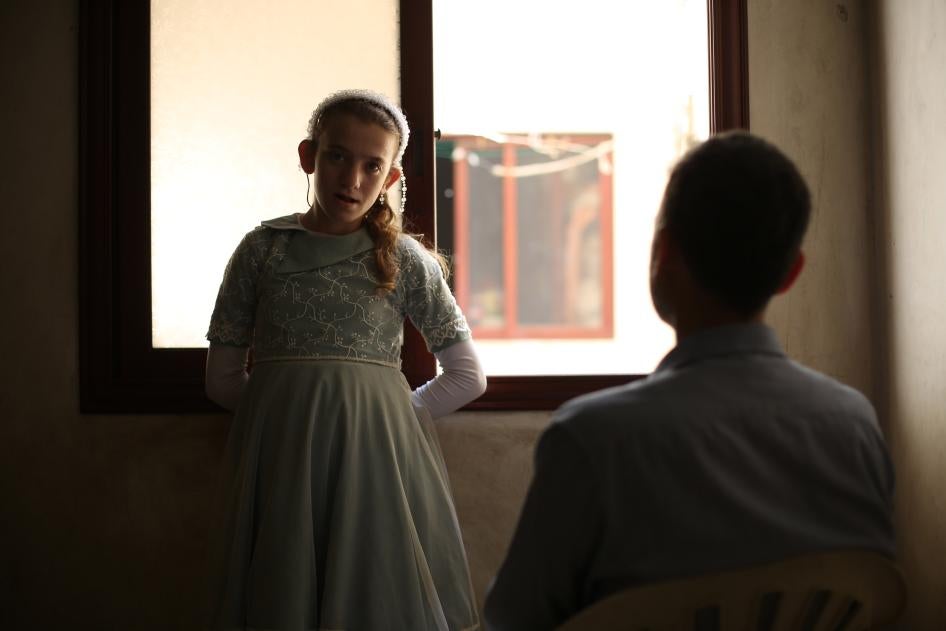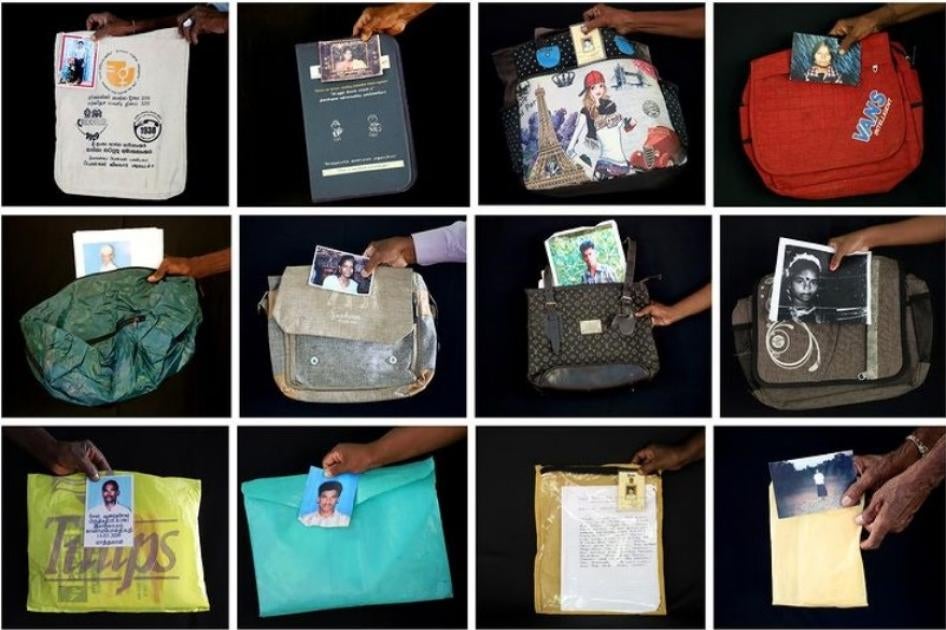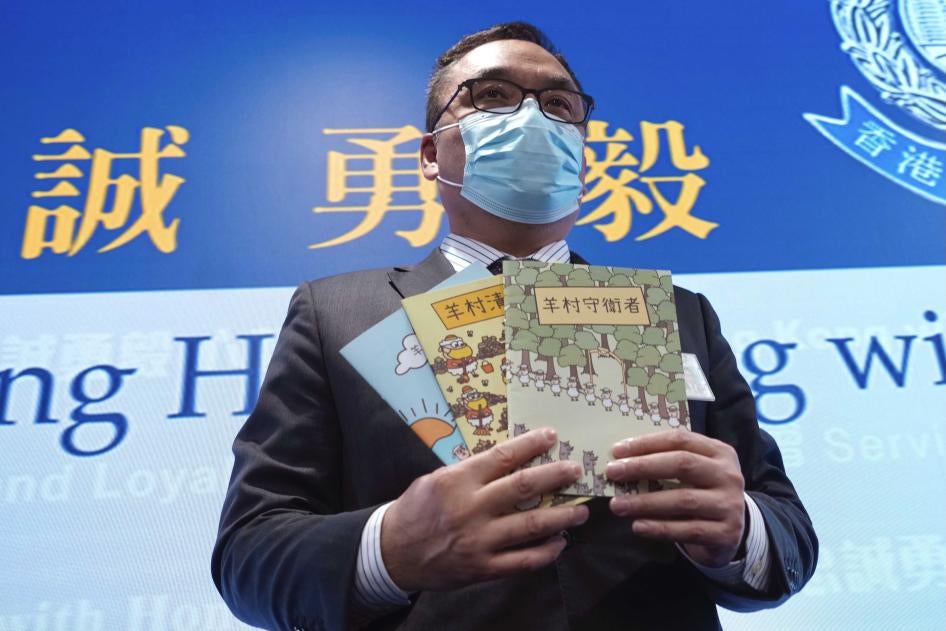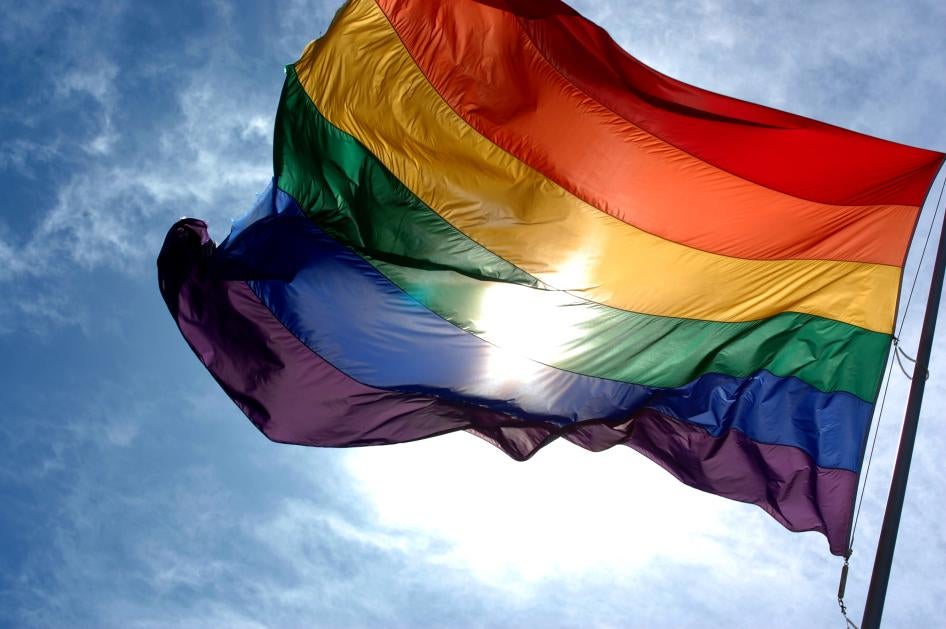Failed by Their Government and by the World: Daily Brief
- Supporting Children with Disabilities in Syria;
- Reader Tip: The Luggage of Pain;
- Convicted for Kids’ Books in Hong Kong;
- Take Note;
- Seeking Your Ideas: LGBT+ Rights;
- Quote of the Day: Venezuela.
By Andrew Stroehlein. Contact me at DailyBriefTeam@hrw.org and Twitter @astroehlein.
Supporting Children with Disabilities in Syria
In 2013, when Shahd was two years old, a barrel bomb was dropped on her neighborhood. Since then, she can’t hear the bombs anymore.
It’s a story repeated with thousands of variations across Syria: child victims of the war are living not only with the deep trauma of their experiences and the fresh terror of new threats, but also with physical disabilities caused by the conflict.
As one of the world’s deadliest conflicts enters its 12th year, the Syrian government is failing these kids, and not just by dropping barrel bombs on them, but by what they do – or don’t do – more generally. Children with disabilities caught up in the conflict are at greater risk of harm, but they lack access to the health care, education, and humanitarian aid needed to protect their basic rights.
To make matters worse, international support for them is woefully inadequate.
In a major new report, “‘It Was Really Hard to Protect Myself’: Impact of the Armed Conflict in Syria on Children with Disabilities,” we are both highlighting the problem and offering solutions.
The report focuses primarily on people living in northwest and northeast Syria, where humanitarian needs are particularly acute and infrastructure is lacking. The government offers no inclusive and universal programs for kids with disabilities: not in education, not in delivery of humanitarian aid, and not in mental health and psychosocial support services.
And despite billions of dollars in international aid over the years, humanitarian operations in Syria have failed to even sufficiently identify, let alone address, the rights and needs of children with various types of disabilities.
If you can’t find time to read the 71-page report, do at least spend a few minutes with the stunning interactive presentation my media colleagues have created along with the lead author of the report, Emina Ćerimović. There you’ll learn more about Shahd and others like her – and what should be done to help them.
The reason Shahd can’t hear the bombs today is clear. The reason the world can’t hear her cries isn’t.
Reader Tip: The Luggage of Pain
A Daily Brief reader got in touch to recommend a powerful series of images they found on Instagram. It simply shows the hands of people holding bags with old photos of their one-time owners: their family members who were forcibly disappeared in Sri Lanka at the end of the civil war in 2009.
“The Luggage of Pain” is a project by Selvaraja Rajasegar, editor of citizen journalism website Maatram, who posts on Instagram at rajeshshot.
Some of his interviewees say they had seen relatives surrender to the military. Some say they last saw their loved ones in the military’s cynically named, “No Fire Zone,” where, during the final days of the war, people were corralled into an ever-smaller rebel-held area and shelled mercilessly.
The Daily Brief reader who pointed me in the direction of this Instagram account lived and worked with victims and survivors in Sri Lanka at the end of the war. With a familiarity rooted in that traumatic experience, he rightly describes the notes that accompany each post as, “moving, distressing, frustrating…”
Indeed, though what I find most interesting – and hopeful – is that the images are not mementos of the past so much as evidence of an active social movement today. Relatives of the missing seeking answers about the fate of their loved ones have been carrying out continuous protests for more than 2000 days in several parts of the country.
The relatives of the missing are not giving up. They are, in the words of Selvaraja Rajasegar, “fighting with unwavering courage despite threats, surveillance and attacks, till this moment.” It has not been easy: HRW has documented the intimidation they’ve faced.
Thankfully, they have allies around the world.
Just yesterday, the Public Interest Advocacy Centre in Australia announced a new database of human rights violations with an interactive map. The day before that, the UN published a new report aimed at Sri Lanka’s new government and calling for accountability and deeper institutional reforms to prevent a recurrence of past abuses.
Together, everyone is simply seeking the truth. And justice.
(Note: This story idea came from a reader. If you have a tip or suggestion, please email me or contact me on Twitter, and also let me know if I can use your name or if I should keep it anonymous like I did for this reader.)
Convicted for Kids’ Books in Hong Kong
Once upon a time, there were five authors who wrote a book about sheep. The ruler of the land was cruel and terrible. He didn’t like the book, and he threw the authors in the castle dungeon. The end.
It’s not a fairy tale but the latest news from Hong Kong, where a court has convicted five authors for publishing a children’s book series. They now face up to two years in prison.
Yes, it really was about sheep.
Prosecutors contended that the defendants’ three-book series, entitled Sheep Village, about a flock of sheep resisting the tyrannical rule of a wolf pack, spread “separatist” ideas by portraying the Chinese government as a “brutal, authoritarian, surveillance state,” feared by its people.
It’s telling that the authorities would readily identify themselves with the wolves…
Of course, the Sheep Village books, published in 2020 and 2021, are a political allegory, depicting events that led to the 2019 protests in Hong Kong, and raising awareness of the 12 Hong Kong activists held incommunicado in mainland China.
Still, the prosecutions are absurd. To say that kids’ books about sheep endanger national security is ridiculous. And through their heavy-handed move, the authorities both admit and confirm their wolf-like rule.
Once upon a time, Hong Kong was celebrated for its commitment to rule of law. Today, the authorities go to ludicrous lengths to eliminate anything that smacks of dissent.
Baa.
________________________________________________________________
Take Note
(curated today by Alice Autin)
- Egyptian journalists charged with spreading false news (Mada Masr)
- US accuses Russia of war crime of forcibly deporting Ukrainians (Reuters)
- Disastrous Pakistan floods severely impact millions of children (HRW)
- Proposed law in Iraq’s Kurdistan would punish LBGT rights advocates (HRW)
- Recent attacks against transgender people in Germany underline need for protections (DW)
- Organizations call on COP27 to address loss and damage financing for poorer countries (Climate Action Network International)
- Australian parliament passes first climate change legislation in a decade (The Guardian)
- Prominent Afghan disability rights advocate awarded fellowship (HRW)
Seeking Your Ideas: LGBT+ Rights
Dear Readers! We are launching a new newsletter on LGBT+ rights, and we’re very keen to get your input.
Please, help us out by taking this short survey.
________________________________________________________________
Quote of the Day: Venezuela
“Extending the UN Fact-Finding Mission's mandate to investigate egregious crimes committed in Venezuela is key for accountability and international scrutiny.”
Tamara Taraciuk, HRW’s Americas deputy director, on Twitter
________________________________________________________________
Help promote human rights – forward this email to others & encourage them to sign up here.



